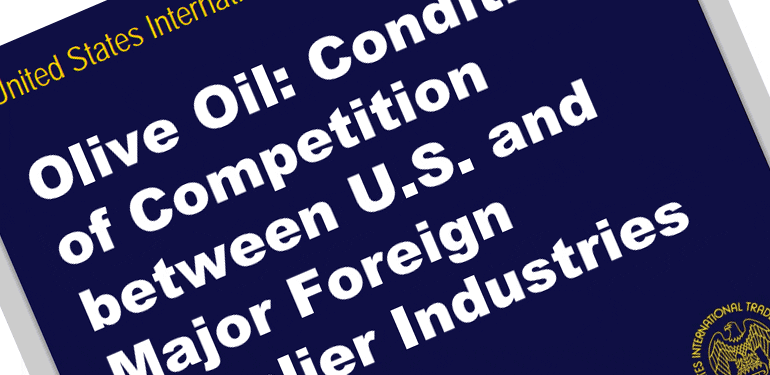
The North American Olive Oil Association (NAOOA) said the report on an investigation into the olive oil industry by the U.S. International Trade Commission (USITC) “fell short of the objective analysis that Congress requested,” and “favored the narrow perspective of the domestic industry.”
Favored the narrow perspective of the domestic industry
In a copy of a letter to the USITC chairman dated December 6 and obtained by Olive Oil Times, NAOOA executive vice president Eryn A. Balch laid out the group’s response to the report released last September that some experts said would provide ample grounds for trade actions and formal WTO complaints against E.U. olive oils imported into the U.S.
Report relies on “undefined terms”
Balch complained that the report’s “widespread reliance” on the terms “low quality” and “high quality” to describe olive oils that meet or exceed the International Olive Council extra virgin grade standard led to the “erroneous implication” that some olive oils that make the grade are “more worthy” than others that also meet the benchmarks.
Fails to question the “integrity” of UC Davis Olive Center reports
The USITC report cited various studies by the University of California at Davis Olive Center as facts to support its findings even though the Olive Center is, Balch wrote, “a marketing agent for California olive oil with a vested interest in promoting domestically.”
Advocates PPP and DAGs tests despite “serious flaws”
The importers’ group said the USITC report is too quick to embrace the chemical tests known as PPP and DAGs that domestic groups are pushing as better methods for determining olive oil quality. Balch said the tests were unreliable and favored olive varieties widely used in domestic production.
Focuses on domestic marketing order
The USITC repeatedly considered a marketing order proposed by some domestic producers, but failed to acknowledge alternatives, Balch wrote, such as a “research and promotion order” that the NAOOA has been calling for.
In September, the International Olive Council weighed in on the USITC report, saying it “may not be sufficiently objective, corroborated or consistent.”
The year-long USITC investigation, which cost an estimated $2 million, was requested by the U.S. House Ways and Means Committee chairman, Dave Kamp, in October, 2012. The document examines the complex global olive oil industry and the conditions confronting American olive oil producers.




